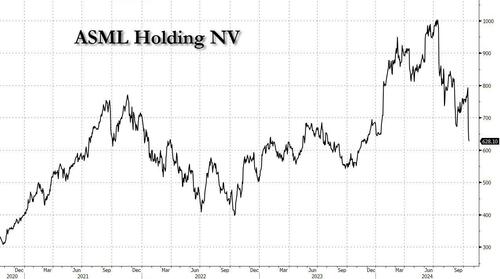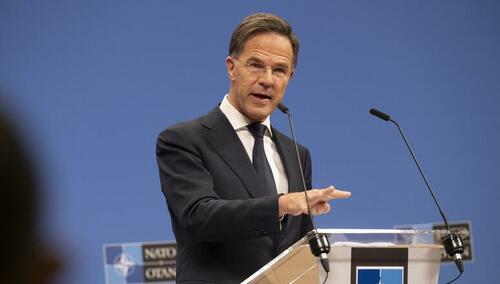Press Conferences, Meetings, & Summits
By Maartje Wijffelaars, senior Eurozone economist at Rabobank
Yesterday’s press conference by ASML’s CEO Fouquet did little to reassure investors. After a major drop in the company’s share price on Tuesday over disappointing orders, erasing some EUR 50bn of market value, shares fell another 5% on Wednesday – with some large swings during the day. ASML’s extended fall did drag down the Dutch AEX stock index on Wednesday, but didn’t have the broad scale ramifications for other chips stocks and tech heavy indices as was the case on Tuesday (US)/ Wednesday (Asia). Then, the aggregate loss of chips stocks in the US and Asia amounted to USD 420bn. Bloomberg’s Asia Pacific Semiconductors Index suffered a 0.5% loss overnight, but the composite index was broadly flat in the US yesterday (+0.2%). Nvidia was clearly one of the best performers and this actually fits with ASML’s story that it still sees strong demand for AI-related chips and hence the machines to manufacture them, whereas it is in other segments that the demand outlook is more lacklustre.
An example of the latter is the weaker outlook for chips in the automotive sector, for example, due to weaker than expected demand for EV’s. It’s news that has been coming out repeatedly in the EU recently. More broadly, it’s not only EV sales that are suffering, though. Stories about weakness in the German car sector, were accompanied yesterday by the Franco-Italian car maker Stellantis. The latter’s results showed that shipments had dropped by 20% y/y in Q3 upon falling orders from the US (-36%), EU (-17%) and China (-30%).
Back to chips, the weak demand environment has also postponed plans of US’ intel to open two chip factories in Europe, Germany and Poland, by two years. This hurts the EU’s strive for more strategic goods production and has obviously also fed into weaker orders for ASML than previously expected – and contrasts TSMC’s revenue jump in Q3 as it rides the AI wave. According to Fouquet, customers are not yet calling off orders, but rather delaying them. This fits with our narrative that we’re currently in a cyclical downturn, but that the outlook should improve somewhat next year.
At the same time, it’s no secret that China’s economy is doing poorly and the recovery just doesn’t seem take off. Efforts so far by the PBOC and Politburo to support the economy by effectively lowering the costs and increasing the opportunities of lending credit are not likely to boost the economy sufficiently in our view. And measures announced in Thursday’s unusual press conference by China’s housing minister, on support measures for the property sector – to boost lending for stalled projects – is unlikely to change this narrative.
Day ahead
Today marks the start of a two-day Nato Defence Ministers summit and the European Council meeting. In a preview, new NATO Secretary General Mark Rutte stated, among others, that NATO allies should “move further and faster to meet the growing threats we face” and “this requires more forces, capabilities and investment to meet the ambitious targets set by our defence plans”. Apart from many other things, this implies many EU governments would have to up their games, even to meet the longstanding targets of 2% of GDP defence spending.
At the European Council meeting, heads of state will talk about Ukraine, the Middle East, competitiveness and immigration. With respect to the war in the Ukraine, EU leaders are expected to talk about the Russia sanction regime, possibly about what to do with rising Russian LNG imports and supporting Ukraine. While the US yesterday announced a new USD 425mn aid package including air defence capabilities, munitions and vehicles, the EU will discuss financial support – we clearly don’t actually have ammunition to send.
G7 countries are expected to decide on the ‘terms’ of an USD 50bn loan to Ukraine by the end of October. The EU and the US together are supposed to cough up USD 35bn. The idea is that the loan will be repaid using the profits on freezed Russian assets in the EU and the US – the EU immobilised over EUR 200bn worth of assets. The freezing of assets is part of the sanction package that has to be reviewed and approved by all EU member states, every six months. The US apparently suspicious that one of the EU member states could lift its support to freezing the assets, wants the EU to lengthen the sanction renewal time frame from 6 to 36 months, before it agrees to take part in the USD 35bn part of the loan. All countries but Hungary approve, as Orbán claims he won’t take part in a deal with the Biden administration that the running candidate Donald Trump doesn’t want.
If others cannot persuade Hungary to get on board with the sanction framework review, the loan would still go ahead, but US involvement would likely be substantially smaller. This would mean that the EU, including Hungary, would have to shoulder a larger share of the USD 35bn loan – money for the loan would be raised on behalf of the EU and guaranteed by the EU budget.
With respect to migration, more and more countries are calling for stronger border controls and faster deportations, and are open to discuss paying foreign countries to take in migrants send ‘back’ by the EU – as right-wing forces are gaining influence. The Italian deal with Albania, according to which Italy sends migrants intercepted on the water to Albania, to be processed there under Italian jurisdiction, will likely also be touted.
At the other side of the Atlantic we’ll have US September retail sales and industrial production. Retail sales by the control group are expected to have increased by 0.3% compared to August and industrial production to have contracted by 0.2% m/m. The Fed’s Goolsbee will speak at 17:00.
Tyler Durden
Thu, 10/17/2024 – 11:15
via ZeroHedge News https://ift.tt/ndS5Ylx Tyler Durden

